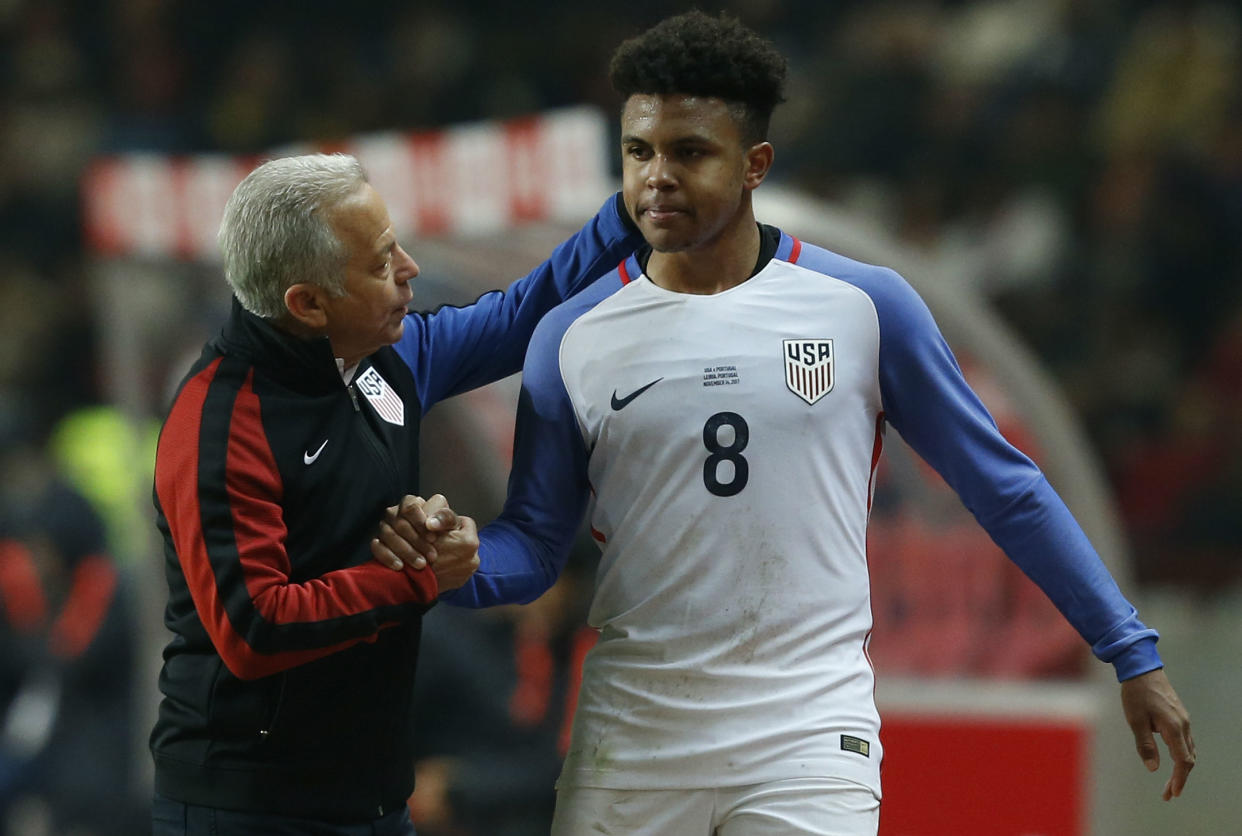So maybe there's one upside to the USMNT failing to qualify for the World Cup

Let’s go looking for a silver lining. There are clouds aplenty hovering over the United States men’s national team, following it around wherever it goes now, but a few of them are surely framed by something redeeming.
How about the change and modernization within the federation this might help bring about?
Well, no. That’s not a price worth paying for almost eight years (at least) without a World Cup appearance.
Maybe this mooted stateside NIT-style tournament of fellow World Cup absentees? Nah, if it even happens, that will just feel like a sad money-grab.
OK, here’s something: the unimaginable failure to reach an eighth consecutive World Cup with a loss in Trinidad and Tobago last month has accelerated the changing of the guard on an old and stale senior national team.
There we go.
Had the Americans made it to Russia next summer, as they were widely expected to, a predictable scenario would have played out. The same old 30-somethings would have formed the spine of the team. Tim Howard would likely have been a 39-year-old starting goalkeeper in spite of being half a decade past his prime. A 35-year-old Clint Dempsey would have been relied on for his attacking spark. And even the old war horse Jermaine Jones, now 36, might have had a shot at a spot — such was since-departed head coach Bruce Arena’s infatuation with him.
And then, after a likely group stage knockout (or, at best, a round-of-16 elimination) that group would have faded from the picture slowly. They might have been eased out. At the very least, a friendly match would have been remade into a testimonial of sorts. They would have taken up spots. And minutes. And space.
Instead, the overdue rebuilding has been accelerated by a good two years. And the foundation for something bigger and better might be laid.
For Tuesday’s suddenly irrelevant friendly with Portugal, interim head coach Dave Sarachan had called in three teenagers and 11 players aged 24 or younger. Nobody was older than 30. You might argue that he should have gone younger still — after all, seven players were 27 or older — because veteran leadership isn’t terribly germane to the game when you aren’t playing for anything. It really just takes away valuable learning opportunities against the reigning European champions.
But either way, all that youth got an opportunity to shine. In the first game since the debacle in Trinidad, the vague outlines of a new national team already began to emerge in the 1-1 tie.
Schalke’s promising young midfielder Weston McKennie made an excellent debut, scoring a goal in which he both won the ball to start the move and finished it expertly.
Debut goal for Weston McKennie! https://t.co/JiUklslDif
— FOX Soccer (@FOXSoccer) November 14, 2017
McKennie partnered well with FC Dallas’s Kellyn Acosta in central midfield. And, suddenly, it’s not hard to imagine Borussia Dortmund’s Christian Pulisic playing in front of them. McKennie, Acosta and Pulisic are 19, 22 and 19 years old, respectively. All three could surpass any American midfielder to come before them.
Tyler Adams played fine in his own debut, playing out of position as a winger, and had a goal denied by a magnificent Beto save. The New York Red Bulls sensation is 18 and could play in the middle with those aforementioned three, or beside them as a wing back.
In the back, Matt Miazga looked sharp in the middle. After an early move to Chelsea and extended time on loan with Vitesse in the Netherlands, he has clearly made strides. He’s 22. Cameron Carter-Vickers, who played beside him in the second half, has a hard task of breaking into Tottenham Hotspur’s starting lineup, but he’s just 19. Meantime, John Brooks of Wolfsburg, the best central defender in the pool, is only 24.
Oh, and Josh Sargent, who is Werder Bremen-bound, was also in camp. He didn’t dress for the game because of an apparent injury. But the 17-year-old is the most exciting striker to come through the program in years and is already getting a look with the senior team.
But what was more impressive than the ages of those players is that they were undaunted by a Portugal team that was missing Cristiano Ronaldo and several other stars, but that was hardly a B-team. It was an A-minus side, shall we say.
And were it not for Ethan Horvath’s howler just a half-hour into the game, the U.S. might have dragged out a win. The goalkeeper fumbled a routine dipping cross from Vitorino Antunes, which slipped through his hands and then through his legs, trickling over the goal line, undoing McKennie’s early go-ahead score.
Nonetheless, the U.S. clung onto a result in spite of a shaky period following the equalizer. Even though Portugal was the better team for most of the second half, the Americans had chances. And while the result itself doesn’t matter very much, the fact that such a young team could see out a tricky game does. That’s promising.
There’s plenty that’s promising that we got a peak at on Tuesday, in fact. We’re almost five years out from the next time we’ll see the U.S. at another World Cup, at the earliest, but we’re already getting a look at the future.
Leander Schaerlaeckens is a Yahoo Sports soccer columnist and a sports communication lecturer at Marist College. Follow him on Twitter @LeanderAlphabet.



